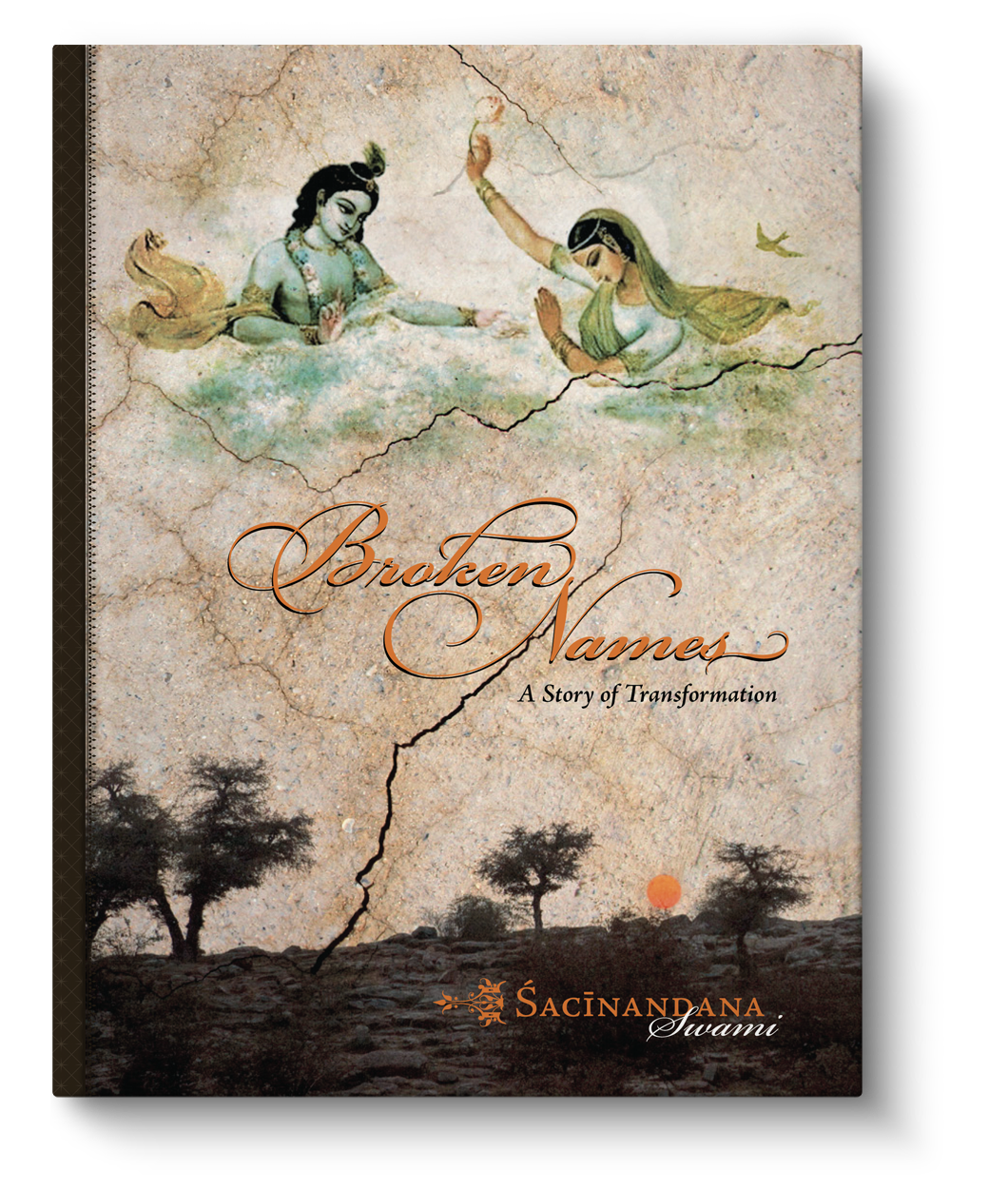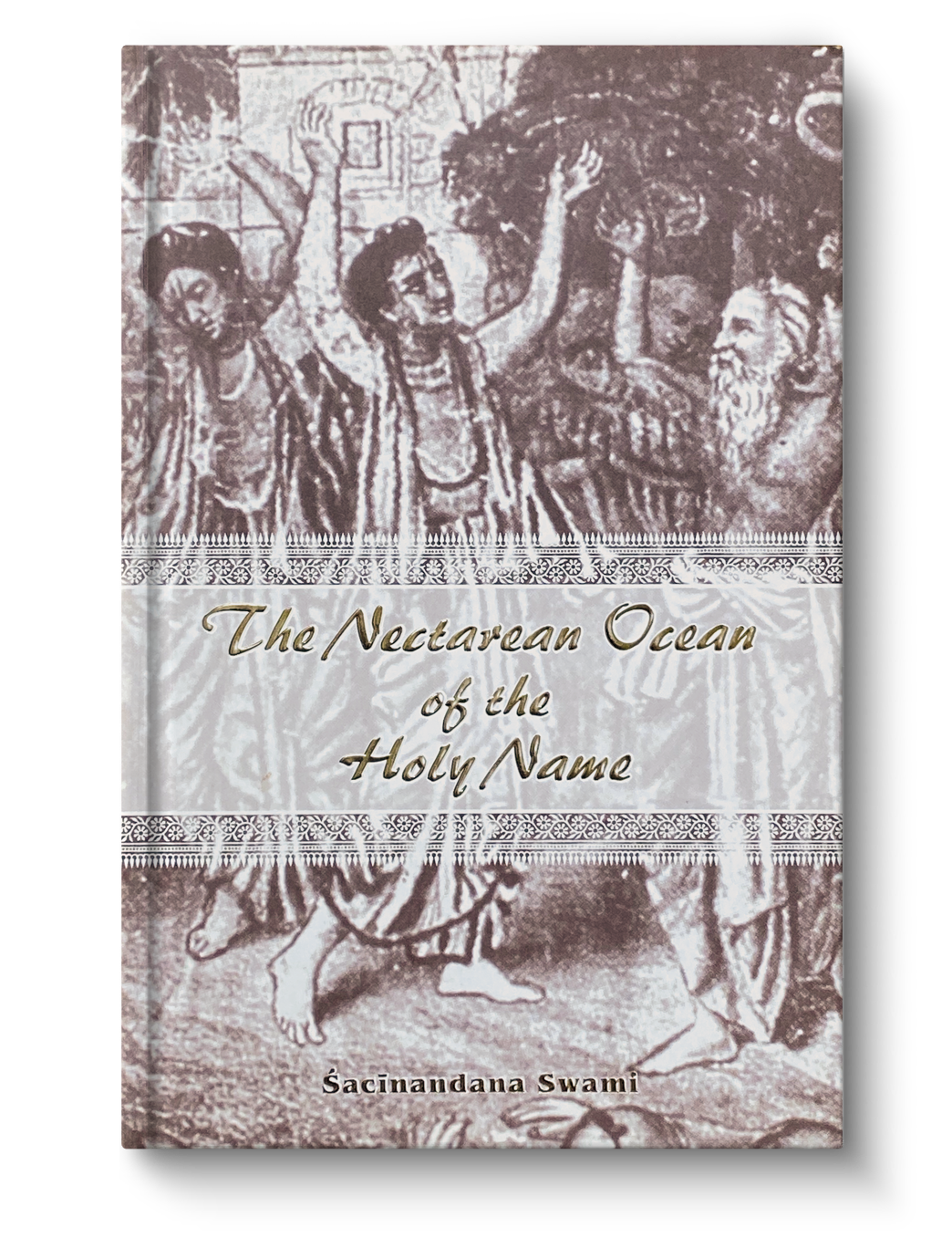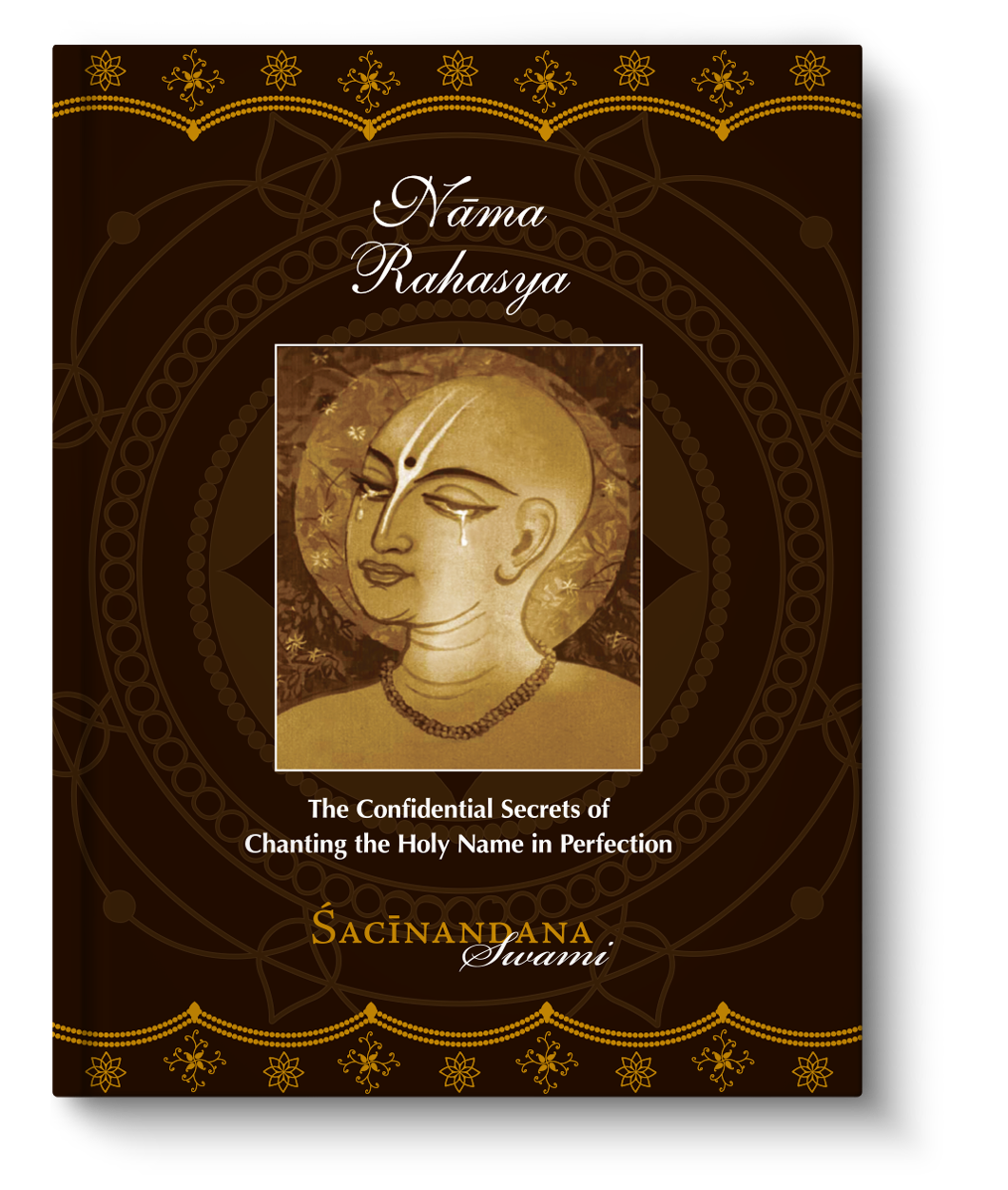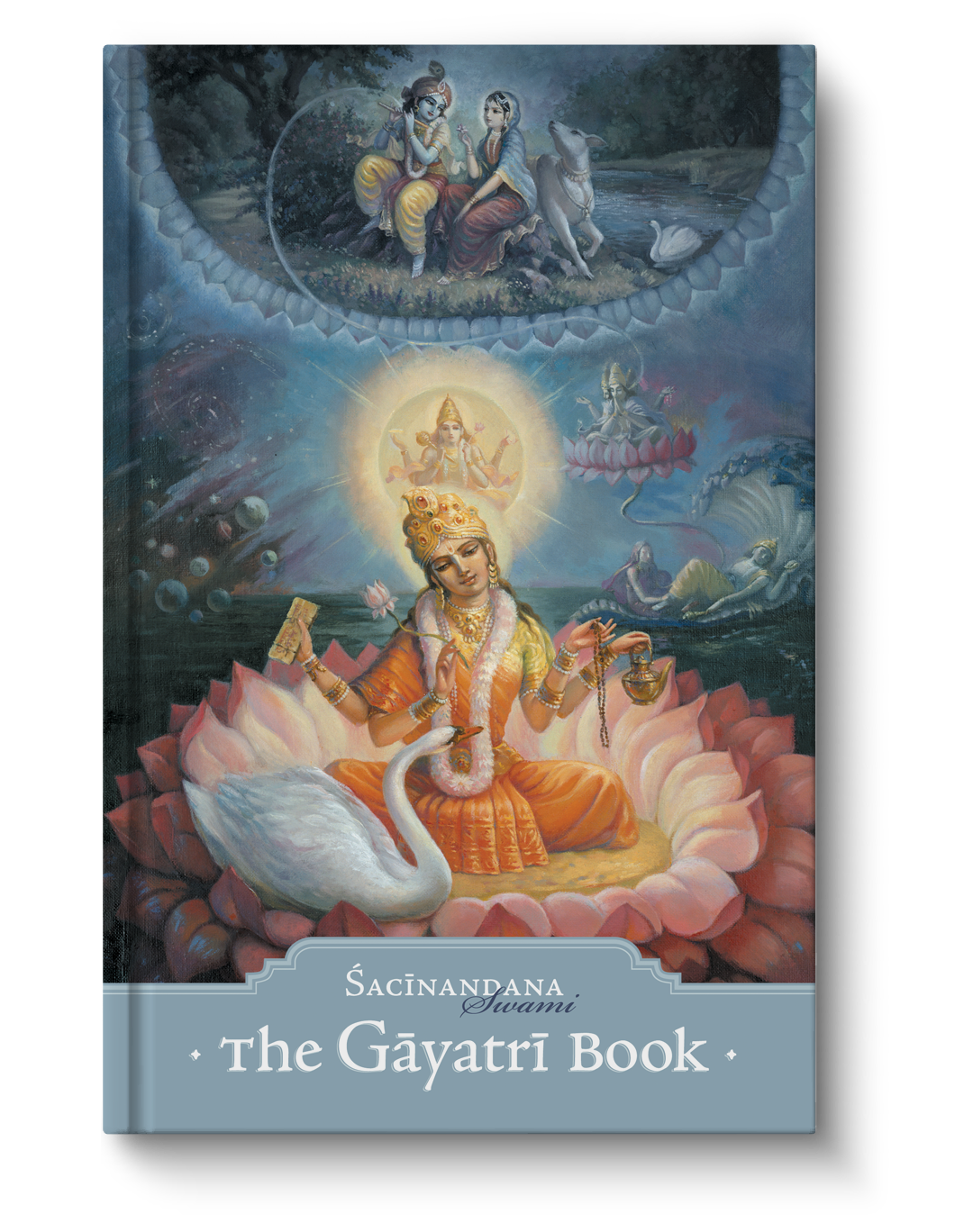Developing a relationship with Krishna only really happens when you hear about him deeply and consistently.
The Living Name
A Guide to Chanting with Absorption
Just as the five life airs animate the body with life, the five powerful practices in The Living Name can enliven the chanting of the Holy Name and turn it into a dynamic and transformative experience. The Living Name has been churned from the teachings of the great spiritual masters, sacred scriptures and the experiences of exalted saints. The result is a comprehensive guidebook that takes you to the heart of the most accessible practice of self-realization: chanting the Holy Names. In this guidebook one will be systematically guided to higher and higher levels of chanting and spiritual life.
The first practice is yojana or alignment – where one learns how to align body, mind and heart to overcome distraction and thus embark on the path of full absorption. This powerful and transformative practice invites the Holy Name to work His wonders and quickly purify us.
The next level is sambandha, or divine connection. Chanting in sambandha means to chant with a feeling of relationship to Krishna. To chant in this way is spiritually very nourishing! There is nothing more encouraging than feeling the sweet closeness of Krishna as we continue to move towards Him in devotion.
After this the reader is brought to the essence of bhakti: chanting in the mood of service, or seva. Krishna is irresistibly drawn to us the moment we chant with a service attitude and when we pray for service. The exercises in this chapter can dramatically help bring the spirit of service into our chanting.
After seva one learns to imbibe their chanting with the mood of separation, or vipralambha. To chant in vipralambha is the real perfection of our chanting. This mood will help us please Krishna and obtain His mercy. Vipra denotes distance and alamba is to attain. Thus, the word means “to attain that which is in the distance.” Chanting in such a way means we deepen our feeling of separation from Krishna, which is very effective in opening the heart and inviting Him to reside within.
The last practice is saranagati or chanting with surrender. In kirtan and japa we surrender to the Lord by expressing our heart, “I belong only to You.” The nature of the Lord is such that whenever He sees someone walking on the path of saranagati and taking shelter of His Divine Names, He will turn towards that devotee and say, “Yes, what do you wish for?”
In Sacinandana Swami’s own words, “I cannot claim to be the author of the Living Name because I have only brought together the insights of sacred scriptures, and the teachings of Sri Caitanya Mahaprabhu, His followers, my own spiritual master and the saintly devotees. Like a grateful man who jubilantly opens his treasury to show the jewels he collected, I have shared with you the gifts which have been given to me.”
Broken Names
A Story of Transformation
Broken Names tells the exciting story of the inner transformation of a young pilgrim named Vishvambhara, who, in the company of his guru and one mysterious saint, rediscovers his faith in chanting the divine names.
The story describes an inner spiritual journey with many facets, such as doubts, dry and mechanical practice, spiritual questions and answers, real taste, etc. Everyone will be able to relate to these to lesser or greater degrees, as each reader may recognize these elements or sides within him or herself and find often surprising solutions to obstacles. Packed in a highly intruiging narrative this novel offers a penetrating insight on the persona of a spiritual seeker – the doubter, the beliver, the “out of the box thinker” etc. which often are part of the same person.
In Sacinandana Swami’s own words, “When we become more aware of which part of us is influencing us at a given time, we can much better understand our position and find the direction we need to take in order to progress.” In the epilogue Sacinandana Swami encourages us to take this little book as an impetus to reflect on our own spiritual journey. Broken Names is deeply spiritual and at the same time highly relevant for modern practitioners of bhakti.„Yesterday I read Broken Names. I want to thank you for that composition, a gift to the Vaisnava community including myself. In a very captivating narrative you have passed on wonderful capsules of advice on how we struggling sadhakas can raise the quality of our chanting of the all so sweet names of the Divine Couple. I found your teachings illuminating and shall apply them in my own practices.“ Sivarama Swami
The Nectarean Ocean of the holy name
The Nectarean Ocean of the Holy Name offers a broad and lucid approach to the philosophy and practice of the chanting process.
Based on the Harinama Cintamani of Bhaktivinoda Thakura, it serves equally as an entry into the practice of chanting as well as a guidebook to an in-depth practice. Numerous quotes from the Vedic scriptures complete the detailed philosophical and practical instructions.
Sacinandana Swami, who has been practicing the chanting of the holy names of Krishna for more than twenty-five years, renders valuable advice from his own experience.
Thus, the reader will find the book a great source of inspiration for tasting the nectarean ocean of the holy name.
Nama Rahasya
The confidential Secrets of Chanting the Holy Name in Perfection
The Nectarean Ocean of the Holy Name offers a broad and lucid approach to the philosophy and practice of the chanting process.
Based on the Harinama Cintamani of Bhaktivinoda Thakura, it serves equally as an entry into the practice of chanting as well as a guidebook to an in-depth practice. Numerous quotes from the Vedic scriptures complete the detailed philosophical and practical instructions.
Sacinandana Swami, who has been practicing the chanting of the holy names of Krishna for more than twenty-five years, renders valuable advice from his own experience.
Thus, the reader will find the book a great source of inspiration for tasting the nectarean ocean of the holy name.
The Gayatri Book
The Gayatri Book is a comprehensive guide for all who wish to deepen their understanding and practice of chanting the gayatri mantras. It is also a source of great inspiration for aspiring candidates and inquisitive seekers who want to explore the mysteries of those powerful mantras that have been handed down over centuries from realized teachers to their students. Chanting the gayatri mantras enlivens and empowers one in the execution of their bhakti and opens gates to the world of transcendent sound vibration.
As Krishna Ksetra Swami (Kenneth R. Valpey, Ph.D.) wrote, “The Gayatri Book is both a practical manual and a carefully woven explication, thoughtfully structured as an unfolding, blossoming flower, revealing one after another the layers of significance to this important aspect of bhakti practice.”
Whether you are seeking to discover the world of the bhakti culture, where mantra meditation plays an essential role or explore the intricate meanings of the gayatri-mantras themselves, the Gayatri Book will be an excellent guide.





